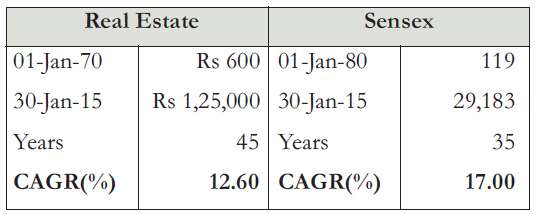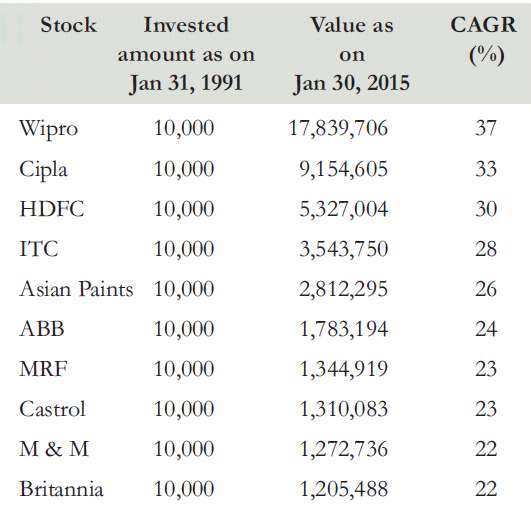“I made huge money in real estate, but not in equities.” You may well be one of those who will agree with this statement.
And it may be true. But have you ever wondered why you were not able to replicate the same with your equity investments? Both asset classes, after all, are known to deliver high double-digit returns in their own way in the Indian context.
What could differ is the approach you follow while investing in real estate and equity. You follow a few basic rules while investing in real estate. You will be surprised to know that you throw all these rules to the wind, and just do the opposite when it comes to equity investments. Let’s see what you subconsciously follow in real estate, and hardly bother to follow when it comes to equity.
Adequate Research and Due Diligence
As you are committing a large sum, you do adequate research before investing in a property. You enquire about the property with real estate consultants, local residents, banks, friends and relatives. You may also take the legal opinion from a lawyer to clarify the title and other legal issues.
Think about the stock in which you lost 90 per cent of your capital. It is likely that you invested in that stock based on a tip from your friend, or from a stockbroker. You would not have bothered to check the quality and credibility of the tip. If you had spared even a third of the effort you did for real estate, chances are you would have realised that it was not a good stock to invest. And who is to be blamed? The asset class called equity?!
Bargain Buying
A penny saved is a penny earned. Before buying a property, you mostly bargain with the seller to get a reasonable price. If the flat promoters are ready to offer a 10 per cent discount, you rush to buy from them.
You follow the exact opposite while investing in the stock market. The stock market is probably the only place where most people invest more in stocks when the prices are higher. Many of you may not be ready to buy a good stock even if it is available at a 50 per cent discount to its intrinsic value. You only buy it when everybody is buying it, that is, when the stock trades at dizzying valuations.
Long-Term Investment
You invest in real estate for the REAL long term and you are willing to hold it even for generations. Even in your worst financial situation, you will always try your level best to avoid selling real estate investments, and may, at best, prefer to take a loan against it. It’s a small wonder you reap the benefits of long-term investing!
Only 10 per cent of investors who invest in the stock market and equity mutual funds are known to hold their investments for more than three years. That means a majority are short-term investors and that’s bad news. You would have sold your holdings for a bit of profit in a rising market, or sold them at a huge loss in a falling market.
Only the truly long-term investors (just like real estate investors) gain superior returns over the long run.
Let us take the price of a premium sea-facing apartment – ‘Samudra Mahal’ in Mumbai. Its current price is Rs 1,25,000 per sq. foot. In 1970, the price in the location was Rs 600 per sq. foot. That means the price has increased by 208 times in 45 years. If you held on to your investment since then, you could have realised a Compounded Annualized Growth Rate (CAGR) of about 12.6 per cent per annum.
Let us take the equity scenario. If you had invested in the Sensex even 10 years hence (January-1980), and held on to your investment, it would have grown by 246 times in 35 years! That is a CAGR of about 17 per cent!

If you add the dividend received (about 2 per cent) from the index constituents, then the CAGR could be over 19 per cent. This is much higher than the returns generated by several of the premium real estate investments.
Several individual stocks could have delivered much more. The value of Rs 10,000 invested in the a few stocks on January 31, 1991 as on January 30, 2015, without any dividend reinvestment, is given in the table below.

Even from a prime location in Mumbai, you are making lesser return in real estate investments when compared with equity investments. And we are talking of such a performance at a time when Mumbai was the most growing real estate market!
Judicious Use of Leverage
While investing in real estate, many of you may not fund the entire amount from your pocket. You need bank funding for most of the amount. Normally, you try to increase your share to avoid paying a higher EMI.
Even though banks are ready to fund up to 80-85 per cent of the property value, you will try to mobilise funds from various sources to increase the down payment for your house. And in any case, banks ensure that you borrow based on your income and repaying capacity.
Thus, you judiciously use / are forced to use leverage while investing in real estate.
While investing in the stock market, you try to exploit the leverage option provided by your stock broker. A few of you may go overboard in futures and options using margin-funding limit, or with borrowed money. Volatile market movements could wipe out your margins, and your stockbroker might exit your positions for steep losses.
To summarize, the simple rules that you unknowingly follow for real estate is what provides you with decent returns; not so much the asset class per se. If only you followed the simple rules you did for real estate, then you should be able to build superior long-term wealth with equities too!
Note: Data and inputs from a presentation sourced from Kotak Asset Management.









Good article. Thanks.
Please do a series of articles on futures & options, targeting investors who are at beginner level for F&O.
Especially, the topics regarding exposure, margins, etc w.r.t F & O.
Or, atleast suggest a good book for the same.
The article is good. But it misses a very critical point. It only talks about upside. What about downside. The advantage of real estate is that the downside is protected. Yes, it might be illiquid for some time but the principal is protected.
On the other hand, in equities, yes you gain but I’ve also experienced equities in which you lose a substantial principle component, which you never recover.
Hi Prashant
I would like to explain my own experience in real estate & stocks.
I invested in a duplex house (suburban location in Chennai) on 2011 for the price of 30 Lacs (25 Lacs loan). I f you take even 10% is my opportunity cost for 3.5 years it is 10.5 Lacs (30 Lacs*10%*3.5 years). 2 months before similar new duplex house in my street was sold for 32 lacs. If I would have invested the down payment, registration expenses, brokerage cost in a bank FD and EMIs into a Bank RD, I would have made decent money. If I sell my property now I would end up in absolute loss as well as opportunity loss for my down payment. Where is the principal protection? I should hold this property for next 10-15 years to get 8-10% CAGR.
Similarly, I have invested in Reliance power in 2008. Even though I understand equity valuations and the issue is highly expensive, I invested my money and lost my capital. It’s my fault not with Reliance power or equity markets. I should have taken sufficient time to analyse the stock before investing in it. Before investing in a property, we compare & evaluate expected rent and growth prospects of the property. However, we don’t do that while investing in stock markets.
If you have invested in right stock (Growing business) and have patience to hold on to it. You will never lose money in equity. For instance, if you have invested in Infosys in the year 2000, you would have lost 75% of your capital in the next year 2001.But if you hold on to the stock till now, you could have made huge gains. I hope you will now understand why you have lost money in stocks.
Happy investing!
Sathyamoorthy N
Great reply Sathyamoorthy, and very true. I have similar experience with real estate. Since real estate is unregulated, we are not tracking at zonal/regional/block level the price variations, factors impacting it, and a reasonable base for future valuations. Generalizing that real estate always goes up is a myth – short term or long term.
On the other hand, in equities/MFs, I know what I am dealing with; if I am not OK, then I take an informed decision – invest or not invest!
On the other hand, we can do an apple-to-apple compare when enough facts are known, totally transparent, with organized impact factors. Otherwise, as far as I am concerned, I am going to treat, analyze, make decisions on these separately, without any comparison/opp cost.
I have purchased a 2BHK flat in Kolkata in Nov 2013. The location as well as locality are good have excellent connectivity. Metro railway as well as BRTS are going to star by 2017. Inspite of these, price of property in this region has fallen by almost Rs 300 per sq feet today in 2015. I agree real estate investments are not always lucrative and ears less than equity in long term.
Clearly and simply good one. Thanks to prs.
Great Article thank for providing such contents
I have come across another which also signifies the importance of investing in Mutual Funds vs real estate
Great Article thank for providing such contents
I have come across another which also signifies the importance of investing in Mutual Funds vs real estate
I always hear real estate is now worth n times investment, but nobody has ever mentioned annualized returns achieved. Although leverage does magnify real estate investments. This calculator – http://www.rentalpropertyreporter.com/resource-center/investment-property-analyzer/ – has the ability to incorporate leverage when calculating return on investments.
I always hear real estate is now worth n times investment, but nobody has ever mentioned annualized returns achieved. Although leverage does magnify real estate investments. This calculator – http://www.rentalpropertyreporter.com/resource-center/investment-property-analyzer/ – has the ability to incorporate leverage when calculating return on investments.
I always hear real estate is now worth n times investment, but nobody has ever mentioned annualized returns achieved. Although leverage does magnify real estate investments. This calculator – http://www.rentalpropertyreporter.com/resource-center/investment-property-analyzer/ – has the ability to incorporate leverage when calculating return on investments.
Clearly and simply good one. Thanks to prs.
I always hear real estate is now worth n times investment, but nobody has ever mentioned annualized returns achieved. Although leverage does magnify real estate investments. This calculator – http://www.rentalpropertyreporter.com/resource-center/investment-property-analyzer/ – has the ability to incorporate leverage when calculating return on investments.
Good article. Thanks.
Please do a series of articles on futures & options, targeting investors who are at beginner level for F&O.
Especially, the topics regarding exposure, margins, etc w.r.t F & O.
Or, atleast suggest a good book for the same.
The article is good. But it misses a very critical point. It only talks about upside. What about downside. The advantage of real estate is that the downside is protected. Yes, it might be illiquid for some time but the principal is protected.
On the other hand, in equities, yes you gain but I’ve also experienced equities in which you lose a substantial principle component, which you never recover.
Hi Prashant
I would like to explain my own experience in real estate & stocks.
I invested in a duplex house (suburban location in Chennai) on 2011 for the price of 30 Lacs (25 Lacs loan). I f you take even 10% is my opportunity cost for 3.5 years it is 10.5 Lacs (30 Lacs*10%*3.5 years). 2 months before similar new duplex house in my street was sold for 32 lacs. If I would have invested the down payment, registration expenses, brokerage cost in a bank FD and EMIs into a Bank RD, I would have made decent money. If I sell my property now I would end up in absolute loss as well as opportunity loss for my down payment. Where is the principal protection? I should hold this property for next 10-15 years to get 8-10% CAGR.
Similarly, I have invested in Reliance power in 2008. Even though I understand equity valuations and the issue is highly expensive, I invested my money and lost my capital. It’s my fault not with Reliance power or equity markets. I should have taken sufficient time to analyse the stock before investing in it. Before investing in a property, we compare & evaluate expected rent and growth prospects of the property. However, we don’t do that while investing in stock markets.
If you have invested in right stock (Growing business) and have patience to hold on to it. You will never lose money in equity. For instance, if you have invested in Infosys in the year 2000, you would have lost 75% of your capital in the next year 2001.But if you hold on to the stock till now, you could have made huge gains. I hope you will now understand why you have lost money in stocks.
Happy investing!
Sathyamoorthy N
Great reply Sathyamoorthy, and very true. I have similar experience with real estate. Since real estate is unregulated, we are not tracking at zonal/regional/block level the price variations, factors impacting it, and a reasonable base for future valuations. Generalizing that real estate always goes up is a myth – short term or long term.
On the other hand, in equities/MFs, I know what I am dealing with; if I am not OK, then I take an informed decision – invest or not invest!
On the other hand, we can do an apple-to-apple compare when enough facts are known, totally transparent, with organized impact factors. Otherwise, as far as I am concerned, I am going to treat, analyze, make decisions on these separately, without any comparison/opp cost.
I have purchased a 2BHK flat in Kolkata in Nov 2013. The location as well as locality are good have excellent connectivity. Metro railway as well as BRTS are going to star by 2017. Inspite of these, price of property in this region has fallen by almost Rs 300 per sq feet today in 2015. I agree real estate investments are not always lucrative and ears less than equity in long term.